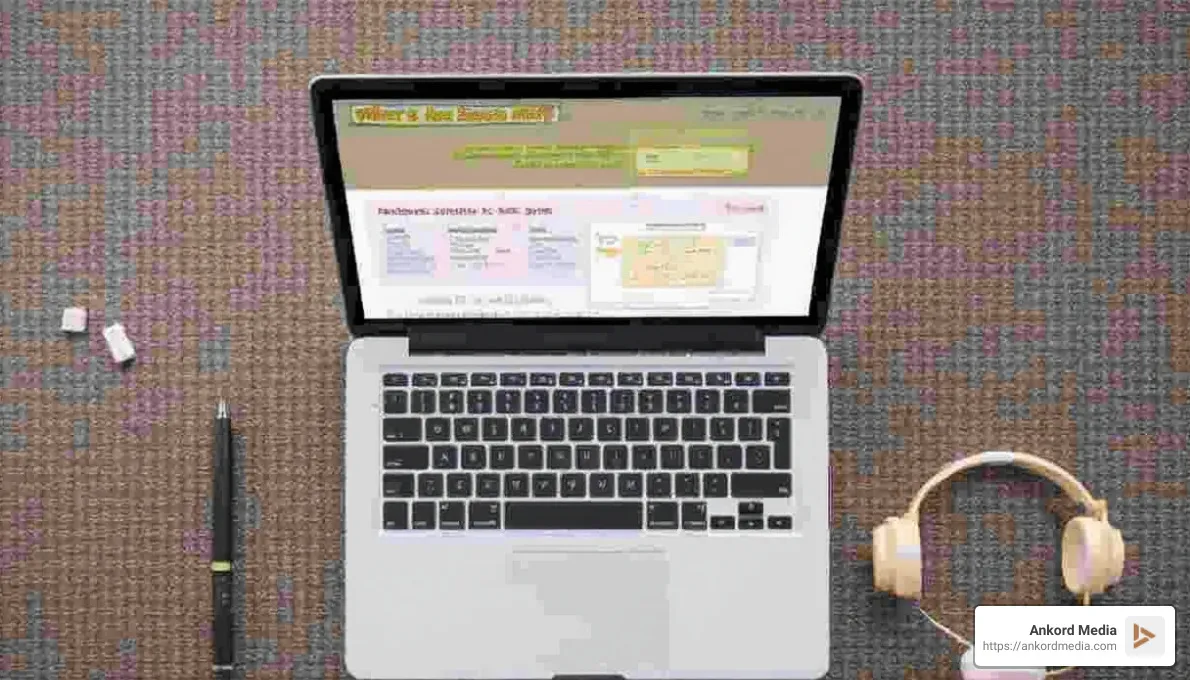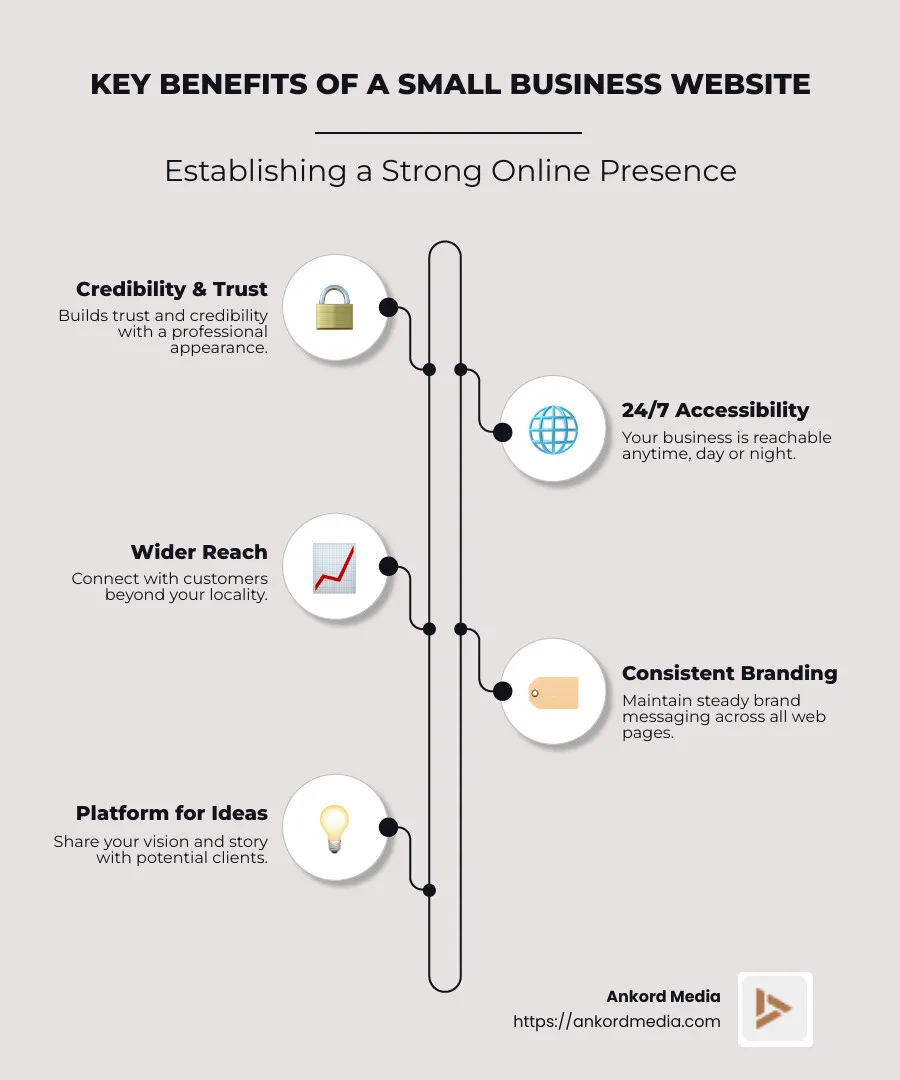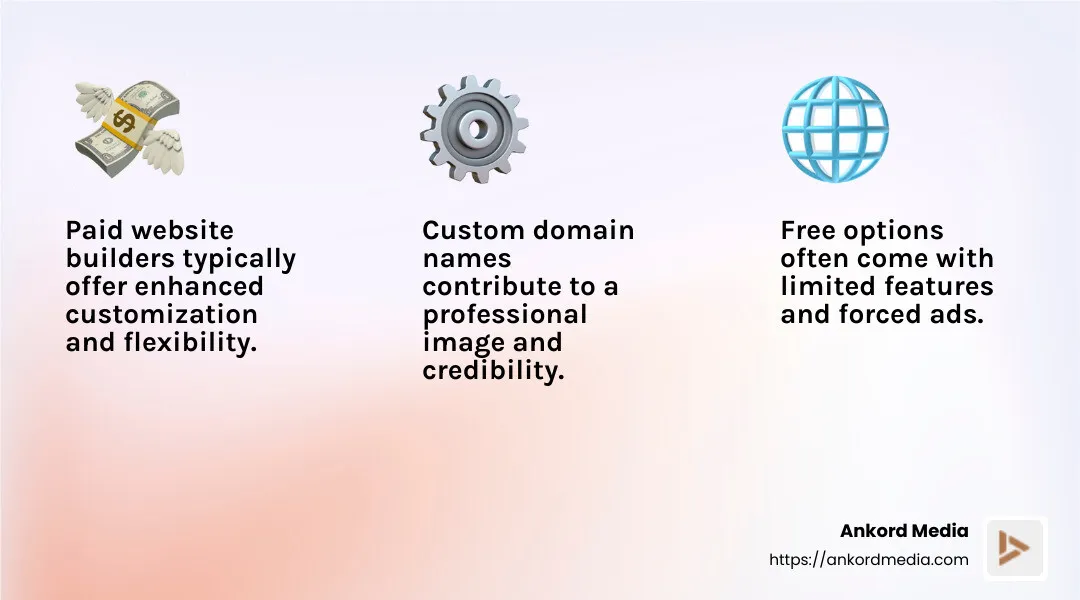
Building a website for a small business is an essential step in establishing your digital presence. Here's why a website is vital for your small business:
- Credibility and Trust: A professional website builds trust and credibility with your audience, showcasing your services and expertise.
- 24/7 Online Presence: Even when your physical store is closed, your website is accessible, allowing customers to learn about your business day or night.
- Wider Reach: A well-designed website helps connect with customers beyond your immediate locality, allowing your business to expand its reach.
- Brand Messaging: Consistent brand messaging across your website secures your business's narrative, helping you stand out.
As a visionary entrepreneur, your website is the platform to share your bold ideas and establish a compelling online presence. It's where your story begins.
With years of experience in guiding businesses to build website small business, I, Milan Kordestani, have witnessed the transformative power of a well-crafted site. From strategic branding to user-focused design, each step contributes towards creating an impactful digital experience.
Let’s dive deeper into how you can create a website that not only meets business goals but also resonates with your audience.

Choosing the Right Platform
When it comes to building a website for a small business, selecting the right platform is crucial. At Ankord Media, we understand that not all platforms are created equal, and choosing the right one can make a significant difference in your website's performance and effectiveness.
Ankord Media's Recommended Platforms
WordPress is one of our top recommendations. It offers extensive customization options and a vast library of plugins, making it ideal for businesses looking for flexibility. Whether you want to integrate e-commerce features or improve your site's SEO, WordPress has the tools you need.
Squarespace is another excellent choice, especially for those seeking sleek, modern designs with minimal effort. Its user-friendly interface and beautiful templates make it easy for anyone to create a professional-looking site.
Wix stands out for its drag-and-drop functionality. It's perfect for business owners who want a hands-on approach to design without the need for coding skills. With numerous templates and design options, you can create a visually appealing site that reflects your brand.
Benefits of Using Ankord Media's Services
Choosing the right platform is just the beginning. At Ankord Media, we offer services that go beyond basic website creation. Here's how we can help:
- Strategic Branding: We ensure your website aligns with your brand's values and goals. Our team crafts a cohesive brand message that resonates with your audience.
- Cutting-Edge Design: We blend aesthetics with functionality, ensuring your site is not only beautiful but also user-friendly. Our designs prioritize user experience, keeping visitors engaged and encouraging them to explore more.
- Technical Expertise: With our deep understanding of various platforms, we handle all the technical aspects, from hosting to security. This allows you to focus on your business while we take care of the tech.
- Ongoing Support: Your website needs to evolve with your business. We provide ongoing support and maintenance to ensure your site remains up-to-date and performs optimally.
Choosing the right platform and leveraging Ankord Media's expertise can transform your small business website into a powerful tool for growth. Whether you're just starting or looking to revamp your existing site, we guide you every step of the way.
With a strong foundation in place, it's time to explore the steps involved in building your small business website. Let's take a closer look at how to bring your vision to life.
Steps to Build a Website for Small Business
Creating a website for your small business involves several key steps. Each is crucial to ensuring your site is effective, engaging, and aligns with your brand's goals.
Domain Name
Your domain name is your website's unique address on the web. It's essential to choose a name that is easy to spell and remember. It should also reflect your business identity.
Consider these tips when selecting a domain name:
- Keep it short and simple: Shorter names are easier to remember and type.
- Avoid numbers and hyphens: These can confuse visitors.
- Use relevant keywords: This can improve your site's visibility in search engines.
- Check availability: Ensure no one else is using your desired domain. You can do this through a domain registrar.
Logo Design
A logo is a visual representation of your brand. It should be memorable and reflect your business's values and mission.
Ankord Media offers professional logo design services that ensure your logo is not only aesthetically pleasing but also aligns with your brand identity. A well-designed logo can leave a lasting impression and improve your site's appeal.
Website Content
Content is king. Your website's content should be engaging, informative, and aligned with your brand's voice. It should clearly communicate what your business does and why customers should choose you.
Consider the following when creating website content:
- Homepage: Provide a clear value proposition and a call to action.
- About Us page: Share your story and build trust with visitors.
- Services/Products page: Detail what you offer and why it's valuable.
- Contact page: Make it easy for visitors to reach you.
Site Testing
Before going live, it's important to test your website thoroughly. This ensures everything works as it should and provides a seamless experience for visitors.
Testing should include:
- Functionality: Check all links, forms, and interactive elements.
- Usability: Ensure the site is easy to steer.
- Compatibility: Test on different devices and browsers to ensure it looks good everywhere.
- Load Speed: Fast-loading pages keep visitors from leaving your site.
Site Maintenance
Once your website is live, regular maintenance is crucial to keep it running smoothly. This includes updating content, checking for broken links, and ensuring security measures are in place.
Ankord Media offers ongoing support and maintenance services. We ensure your site stays updated, secure, and aligned with your business goals.
By following these steps, you can build a website that not only looks great but also supports your business's growth. Next, let's dive into the cost considerations for building a small business website.
Cost Considerations for Building a Small Business Website
When planning to build a website for your small business, understanding the costs involved is crucial. Here’s a breakdown of what you should consider:
Budget Range
The cost of building a website can vary widely, depending on your needs and resources. For a basic, functional website, you might spend anywhere from $100 to $500. This typically covers domain registration, hosting, and a simple design.
For a more customized or feature-rich site, costs can range from $1,000 to $10,000 or more. This higher range often includes professional design services, advanced functionalities, and ongoing maintenance.
Custom-Built Websites
Opting for a custom-built website can provide a unique and custom experience for your visitors. These sites are designed specifically for your business, ensuring they align perfectly with your brand and goals. Ankord Media specializes in crafting custom digital experiences that lift your brand and help you stand out.
Custom websites often involve higher upfront costs but offer greater flexibility and scalability. They are ideal for businesses with specific needs or those looking to integrate complex features like e-commerce or customer relationship management systems.
Free vs Paid Options
Free website builders like Wix or Weebly can be tempting for small businesses on a tight budget. They offer basic templates and functionalities at no cost. However, these options often come with limitations:
- Limited customization: You may not be able to fully tailor the site to your brand.
- Advertisements: Free plans often include ads that can detract from your professional image.
- Generic domain names: You might get a subdomain (e.g., yourbusiness.weebly.com), which can impact credibility.
On the other hand, paid options provide a more polished and professional appearance. They often include additional features like:
- Custom domain names
- Advanced design tools
- E-commerce capabilities
- No ads
Paid plans typically start at around $6 per month, with costs increasing based on additional features and support.

Choosing between free and paid options depends on your business needs, budget, and long-term goals. While free builders can be a good starting point, investing in a paid plan can significantly improve your online presence and professionalism.
Understanding these cost considerations will help you make informed decisions as you move forward with building your website. Next, we'll explore best practices for creating an effective small business website.
Best Practices for Small Business Websites
Creating an effective website for your small business is more than just picking a nice design. It's about ensuring a seamless user experience, optimizing for mobile devices, mastering SEO basics, and integrating multimedia. Let's explore these best practices.
User Experience
A great user experience (UX) keeps visitors on your site longer and encourages them to explore your offerings. Here are some essentials:
- Simple Navigation: Make it easy for users to find what they need. Use clear menus and intuitive layout.
- Fast Loading Times: Slow pages can frustrate users. Optimize images and enable browser caching to keep load times low.
- Accessible Design: Ensure your site is usable for everyone, including those with disabilities. Follow Section 508 guidelines.
Mobile Optimization
With up to half of web traffic coming from smartphones, your site must perform well on mobile devices. Key tips include:
- Responsive Design: Ensure your site adjusts to different screen sizes. This means your website looks great on both phones and tablets.
- Touch-Friendly Elements: Make sure buttons and links are easy to tap with a finger.
- Minimal Pop-Ups: Avoid intrusive pop-ups that can be hard to close on small screens.
SEO Basics
Search Engine Optimization (SEO) helps people find your site. Here are some basics:
- Keywords: Use relevant phrases naturally in your content. Avoid overuse, which can hurt your ranking.
- Valuable Content: Regularly publish content that is useful to your audience. This can include blogs, videos, or case studies.
- Routine Audits: Regularly check your content for updates or improvements. This keeps your site fresh and relevant.
- Fast Load Times: As mentioned in user experience, speed also impacts SEO.
Multimedia Integration
Using multimedia can make your site more engaging and informative:
- Images and Videos: Use high-quality visuals to capture attention. Stock photo libraries can be a good source.
- Audio and Podcasts: Consider adding audio content to reach users who prefer listening over reading.
- Interactive Elements: Features like quizzes or polls can engage users and encourage interaction.
By following these best practices, you can create a small business website that not only looks great but also performs well and meets the needs of your visitors.
Next, we'll address some frequently asked questions about building a small business website, from costs to platform choices.
Frequently Asked Questions about Building a Small Business Website
How much does it cost to build a website for a small business?
Building a website for a small business can vary greatly in cost, depending on your needs and preferences.
- Budget Range: You can start with a basic website for as little as $6 a month using entry-level plans from website builders. However, if you opt for a custom-built website, costs can increase significantly, often ranging from hundreds to thousands of dollars.
- Custom-Built Websites: These offer greater flexibility and customization but come at a higher price. They are ideal if you have specific design requirements or need advanced features.
While free website builders are available, they often come with limitations, such as ads and a generic URL, which can make your site look unprofessional.
Is it worth making a website for a small business?
Absolutely! A website is crucial for establishing trust and credibility with potential customers. Here's why:
- Online Presence: Your website serves as your business's online storefront. It allows customers to find you, learn about your services, and contact you easily.
- Credibility: A well-designed website can make your business appear more credible and trustworthy. It shows that you are professional and serious about what you do.
Which website platform is best for small business?
Choosing the right platform is key to building a website that meets your business needs. Ankord Media recommends platforms that offer ease of use, scalability, and robust features:
- WordPress: Known for its flexibility and wide range of plugins, it's a popular choice for businesses that need a custom solution.
- Wix and Squarespace: These are great for beginners due to their drag-and-drop interfaces and comprehensive templates.
- Shopify: Ideal for businesses focused on e-commerce, providing a full suite of tools to manage online sales.
Ankord Media can help guide you through selecting the best platform for your business, ensuring that your website not only looks great but also functions seamlessly.
Now that we've answered some common questions, let's move on to the final thoughts about crafting your small business website.
Conclusion
Creating a successful small business website is no small feat. It's about more than just putting up a digital signpost. It's about crafting a space that tells your story, connects with your audience, and drives your business forward.
At Ankord Media, we specialize in changing bold ideas into reality through strategic branding and digital experiences. Our approach is simple: we partner with visionary clients to bring their unique stories to life. We believe that every brand has a story to tell, and we are here to help you tell yours in the most impactful way possible.
Strategic Branding: Your brand is more than a logo or a color scheme. It's the essence of who you are and what you stand for. We focus on creating authentic customer connections by weaving your values into every aspect of your digital presence. Our branding strategies ensure that your website not only looks great but also resonates with your audience on a deeper level.
Digital Experiences: In today's digital world, your website is often the first interaction potential customers have with your brand. It's crucial to make that first impression count. We leverage cutting-edge design and technology to create websites that are not only visually stunning but also user-friendly and optimized for performance across all devices.
By choosing Ankord Media, you're not just getting a website. You're getting a partner committed to your success. We measure our achievements by how effectively we amplify the brilliant ideas of our clients, turning them into tangible success.
Ready to lift your brand and craft a website that truly represents your business? Explore our services and see how we can help you transform your vision into reality.


